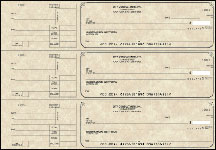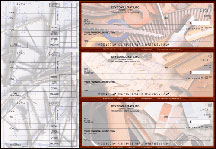Business Check Ups - Under The Hood Checkup For Starting A New Business
Checks For Business |
Business Wallet Checks |
Cheap Business Checks |
|
Computer Checks, Side Tear Manual Checks, Cheap Business Wallet Checks Available in traditional as well as professional specialty designs When you order direct from the manufacturer you'll save up to 50% off bank costs. Cheap Business Checks, Labels and Financial Products direct from the Manufacturer |
|
Business Check Ups When Starting A Business
A good business check for beginning a new business should begin with a business plan. A business plan is simply a written map on how you will go about starting and running your business. If it is not an online business you’ll need to choose a location and ascertain if the businesses comply with zoning and licensing laws. You’ll need to apply for local and state permits or licenses if required.
The second step is financing your business startup. You’ll need startup capital, loans, or venture capital to get started.
Business Structures
You’ll need to determine the legal structure of your company. You’re choice of ownership choices range from sole proprietor, partnership, limited liability company (LLC), S corporation or corporation, to a non-profit.
A partnership is easy to organize and can have greater financial strength by combining managerial skills and having another set of fresh judgments for running the business which can be valuable.
A Limited Liability Company (LLC ) may be treated as a sole proprietorship or a partnership or even a corporation. The advantages are that the owners have a limited personal liability for debts incurred by the actions of the LLC and enjoy the flexibility and benefits of flow through taxation.
An S Corporations is a small business corporation whose shareholders elect ot have corporate income taxed like a partnership. Whereas a corporation is treated as a legal entity. The stockholders have a limited liability and transfer of ownership is easy. It is easier to expand and raise capital and very adaptable to both small and large businesses. The life of the corporation is perpetual. The big disadvantage is that it is taxed twice and is more expensive and difficult to organize.
Next you’ll need to register with state and get tax ID number. Applying for federal and state ID numbers and other legalities are next on the list. That may possibly consist of registering a DBA (doing business as) if you use suffix’s as "& CO" or "& Associates" or anything that denotes additional organization owners or if the name is different than that the S corporation, corporation or LLC, non-profit name.
If you are a corporation, LLC or any business activity for that matter, you’ll need an EIN number. The EIN number is a federal tax identification number and is also known as the Employer Tax Id and Form SS-4.
Just as you need to register an EIN federal number, you’ll also need to register with your state’s revenue agency. This is because they want to tax you and register you for any licensing, permits and include you for income tax withholding as well as sales and any possible use tax permits.
You’ll need to obtain workers’ compensation, unemployment and disability insurance. This is especially mandatory if you will have others in your employ. The only possible exception is a solely owned and run internet market, stock trading from home and other work from home businesses.
If you sell products, you may be required to collect sales taxes and will need a Sales Tax Permit. Be sure to get familiar with state and local taxes and registration requirements.
Should you sell taxable items you’ll want state sales tax ID numbers. In case you hire employees you’ll need to have both federal employer tax identification quantity as well as a state employer tax identification in addition to your basic insurance protection.
Bookkeeping, Record Keeping Practices
Perhaps the most important aspect of a company is your bookkeeping and maintaining accurate records so you know where you stand. This is accomplished by keeping separate bank and checking accounts and check books. Keeping records, setting up accounting procedures so that you comply with making regular income tax payments is essential.
Never mingle personal with organizational expenses or you’ll get in trouble with the IRS. Keep and maintain accessible records in case of an audit. The IRS has recruited new armies of agents who especially scrutinize excessive travel expenses as well as dining out expenses.
Keeping good organized records can help you save money. Most business owners do not want to spend time keeping records and would rather spend time running their business unless they are a professional bookkeeper. Keeping track of business expenses on a systematic basis is tax deductable. These are the common expenses in conduction your trade or business.
Good records will help you monitor your enterprise. It will help you track receipts if any questions arise from customers. Purchases, sales, payroll and supporting documents for any deductions on tax matters need to be kept. Your record keeping should clearly document income and expenses and you’ll need to keep them as long as they are needed. Employment tax records need to be kept for at least four years.
The burden of proof is on you. You are presumed guilty before you begin. It is your responsibility to prove all bookkeeping entries, deductions and statements on your tax return. You have the burden to prove any expenses that you plan to deduct. Good record keeping avoids headaches at tax time. If you use your home office as a business you can deduct mortgage interest, insurance, utilities, repairs, depreciation or rent. Also you can deduct travel using public transportation, maintain your car, meals, lodging and other related expense. These must be ordinary expenses, provable and necessary.
A simple single entry bookkeeping is the simplest to keep. With this system you have a record of daily and monthly business income and expenses. It will show sufficient detail for tax purposes and the focus is on the business’s profit and loss statement and not on its balance sheet.
After you set up the type of bookkeeping system you want, you’ll next need to choose an accounting method. Is it going to be a cash method or accrual method? A cash method reports all income in the year you receive it. You’ll deduct expenses only in the tax year in which you pay your taxes. With an accrual method you’ll report income in the year you earn it regardless of when you receive the payment. As such you’ll deduct expenses in the tax year you incur them regardless of when you actually pay those expenses. If you have the type of business where your inventory is for sale to customers, you’ll generally use an accrual method for your sales.
Some business accounting statement can be helpful. An Income Statement is an overview of your company’s revenues, costs and profitability. That and a Cash Flow Analysis will help you tell how well your business is doing. A Cash Flow Analysis gives a detailed monthly account on how money flows into and out of your business. Subtracting your monthly expenses from your receipts gives you a good gauge of the overall direction of your business direction.
When you start your business checking you can obtained them from your financial institutional banks as well as online. Ordering and reordering checks from bank is not the most economical way of doing business since banks markup their checks costs and it will cost you twice as much as if you ordered online. It is an unnecessary additional expense to any enterprise. Purchasing smart is a virtue and should be pursued in all matters big and small. Purchasing online is economical and quantity discounts and special deals are always available.
These checks come in three-per-page checks, wallet style checks, laser checks, continuous computer forms and payroll checks. Depending on your needs, you’ll have just the style you’ll need.
These can be designed to use your business graphics or logo and even use perhaps a picture representation of your building or what you sell along with the corporate address location. Arranging your stationary and checks format serves two purposes; it helps in advertising your corporate presence and asserts your company's image in its best light.




